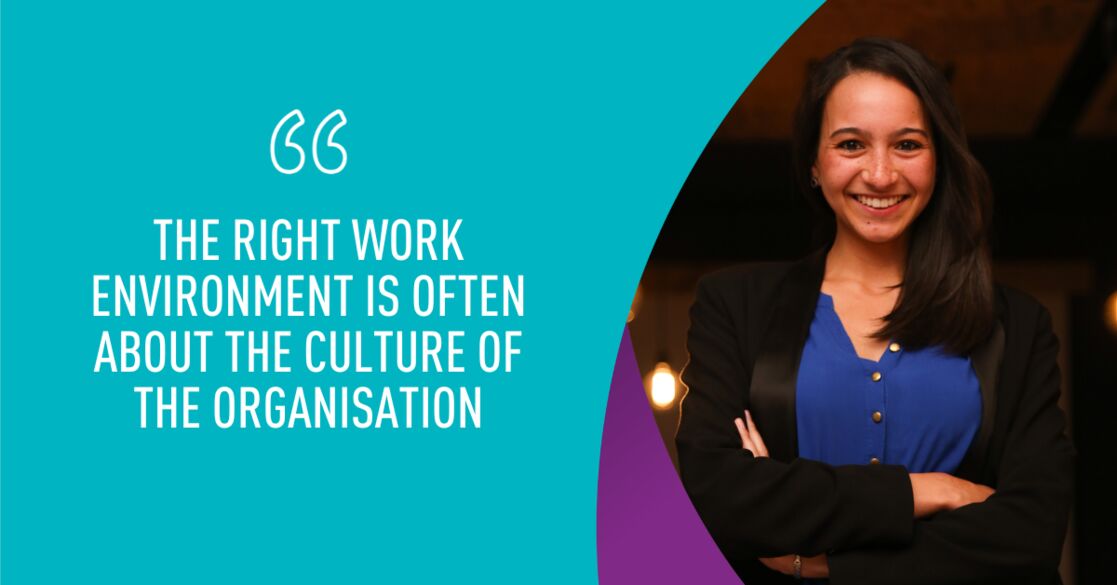For university graduates, searching for and starting a graduate job can be daunting. With limited networks and connections in professional careers, it can be difficult to access advice to set you up for success. Dell Young Leaders program alum Amy shares her advice on finding the right work environment. Amy is an assistant manager within the financial services sector, specializing in forensics.
How do you know if a working environment is right for you?
Through my experience, I’ve learned that the right work environment is a place where you feel comfortable voicing your concerns, and can ask questions without fear of intimidation, humiliation, or anything going wrong.
Quite often you are asked to do tasks in your job, and you don’t always know why you’re doing it, so it’s natural to ask questions around the larger context. In my current work environment, I’m encouraged to ask those questions to provide context. My managers and my team know that I am always trying to figure out the bigger picture and in forensics that’s critical.
What other factors would you encourage recent graduates to look for?
Look at how the company might support your growth. When I start a new role, I always want to start by learning the responsibilities of the role, but I also want to look for ways to improve my skills and knowledge. Explore what opportunities exist for feedback from line managers and potentially any mentorship programmes within the organization. This isn’t about figuring out how to get promoted immediately – but rather understanding how the environment would support you to perform to your potential.
The right work environment is often about the culture of the organisation, whether you fit in. In the different work environments, I’ve been in, I’ve learned to listen to my instinct, deep down you always know if something is right or wrong. If you feel comfortable, then you know you’re in the right environment, but if something triggers you or someone says something that makes you feel uncomfortable, then you definitely question if that’s the right work environment for you.
What helped you in university to prepare you for the working world?
I ended up in a field that I didn’t study in my undergraduate degree so I believe that you can’t necessarily know what the actual working environment is going to be like before you get there. The one thing that I thought was the most useful was the Dell Young Leaders events we had about time management, emotional intelligence, and the importance of soft skills. In the working world, you need to work with different people and understand lots of personalities. You realise you have to understand how to interact with others and how you interact with yourself. You need to be self-aware about how you’re going to react to certain situations and handle them better when you are faced with challenges and situations that you don’t like.
What tips and advice do you have for students looking to join the working world?
The most important thing is to reach out to individuals in the working world to ask them for their first-hand accounts, even as you acknowledge that it won’t be the same for everybody. Recently, one of the Dell Young Leaders students reached out to me and asked me for advice. The fact that she reached out is already a good step for her because she’s thinking ahead to life after university. So often in university, you can get so bogged down with tests and assignments thinking that I just need to get to next week.
In the high-paced university environment, you don’t actually get the time to think about what you want to do. That was definitely true for me. I started in BCom Accounting and thought I would follow the chartered accounting stream like many others. At some point, I realized that wasn’t the path for me, but I didn’t fully know what I wanted to do until I entered the working world. I’m glad I did the different jobs that I did because I see them as stepping stones to where I am today. However, I do feel that I didn’t take enough time at university to ask myself what are you going to do? I kind of waited and applied to jobs that seemed ok, but I didn’t do enough research to see all the potential jobs that I could do.
If you want to work in a particular job, go speak to someone doing that job. Ask those hard questions that you can only get if you ask someone directly as opposed to googling something. Company websites can be useful but you need to get honest input from people doing the job you want to do.
The Career Insights Series is designed to help graduate job seekers. Dell Young Leaders alumni share insights on their career path, highlight a day in the life at their employer, and provide guidance to students on how to stand out to employers and prepare for the world of work.

